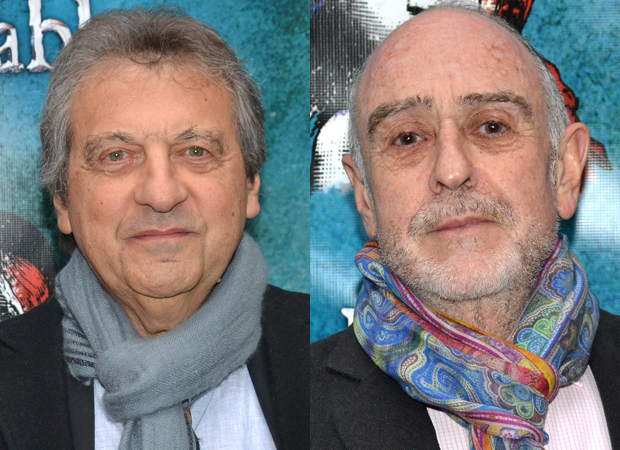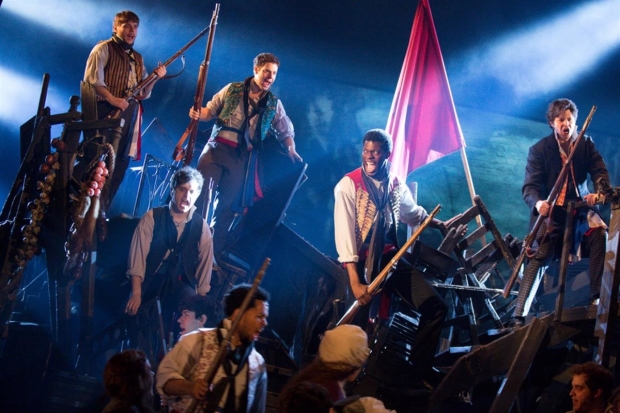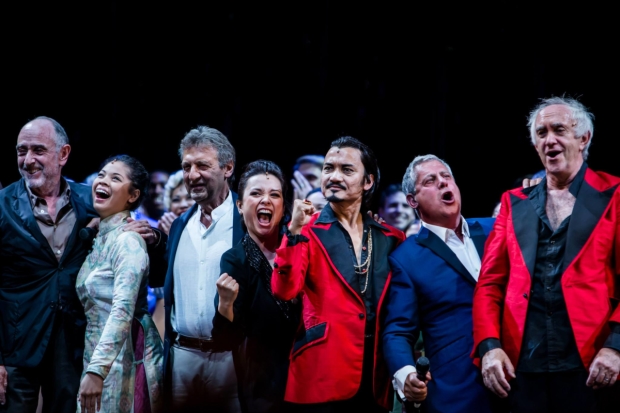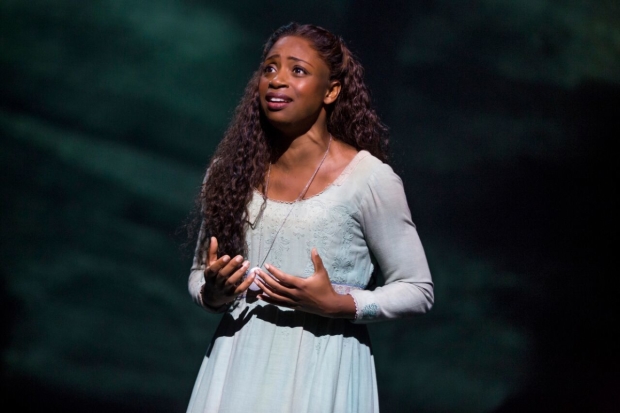Les Misérables and Miss Saigon Scribes Boublil and Schönberg "Hear the People Sing"

(© David Gordon)
"Real creators don't know what they're doing," the composer Claude-Michel Schönberg says with a laugh. And yet, when looking at the body of work he has created with Alain Boublil, this quote he ascribes to Igor Stravinsky couldn't seem to be less true. After all, this pair has written two of the most iconic musicals of the twentieth century, Les Misérables and Miss Saigon, and several others that have developed cult followings.
On Monday, May 2 at Carnegie Hall, the New York Pops orchestra and a host of performers closely linked to these shows will pay tribute to Boublil and Schönberg's work, in a concert fittingly called Do You Hear the People Sing. Though the pair is modest about their excitement, it clearly comes across that they are thrilled by this honor. "It's the cherry on the cake that we never expected," Schönberg admits. "Alain comes from Tunisia, I come from a very small town in France. How can you imagine one day you will be celebrated by your pals at Carnegie Hall?"
Building the Barricade

(© Matthew Murphy)
Boublil was first introduced to Schönberg after hearing one of his songs on the radio. "We discovered a common interest for something very different than a three-minute song," Boublil says. "We were looking to express ourselves in a different format, without knowing the form existed and was called musical theater. We were living in a country where musical theater didn't exist. "
Their first show was the 1973 rock opera La Révolution Française, which Schönberg describes as "twenty-four songs that we linked together to have a show." When that project was completed, "We thought we'd find a good subject to do a full show from beginning to end. Alain came back from London and said I saw Oliver! and the kids on stage, and I immediately thought about Gavroche."
That led the pair to their first iconic musical, Victor Hugo's Les Misérables. "I was surprised nobody thought about [musicalizing] it before," Schönberg says. But someone actually had. "Puccini," Boublil acknowledges, "But he could never get a proper book written and gave up the project."
"Strangely enough," Schönberg continues, "He gave up on Misérables and did Madama Butterfly. We managed to write Les Misérables because he never did it, and we wrote Miss Saigon because he wrote Madame Butterfly. So we can thank him twice."
Sun and Moon

(© Richard Davenport)
Whereas Les Misérables was first performed in Paris, and only later presented in England under the aegis of Cameron Mackintosh and the Royal Shakespeare Company, Miss Saigon opened cold in London in 1989, four years after their first show took the town by storm.
"Suddenly," Boublil remembers, "we were so popular in England that Nick Hytner, the future head of the National Theater, accepts to direct [Miss Saigon], and Jonathan Pryce [chooses to star as the Engineer]. And then we have an unforgettable trip around the world to cast and find the amazing Lea Salonga, who suddenly comes to life in front of our eyes." This exact moment at her audition, with Schönberg teaching her "Sun and Moon," can still be seen on YouTube.
Salonga, then seventeen years old, has been in their lives and careers ever since. As a performer, she broke down a major barrier. "She's very important," Schönberg notes. "After [Miss Saigon], she did Eponine and Fantine, and she was the first Asian actress to do a Caucasian part [in Les Miserables]. In those days, there wasn't multiracial casting. We never had an Asian performer in Les Misérables because of the time period [in which the show is set]." It should be noted that the musical has become one of the most diversely cast shows on Broadway, with non-white performers regularly taking on principal roles.
This Is the Hour

(© Matthew Murphy)
The Carnegie Hall concert will reflect this diversity. Joining Salonga and Patti LuPone, who created the part of Fantine in London, will be Montego Glover, a recent Broadway Fantine; Kyle Scatliffe, a past Enjolras; Norm Lewis, a frequent Javert; Stephanie J. Block, who created the role of Grania in their short-lived The Pirate Queen; and Eva Noblezada, who played Kim in the acclaimed London revival of Miss Saigon and is currently Eponine on the West End.
The show will also allow the pair to simultaneously look back on their past while ahead at the future. As Boublil expects, "Next year, exactly at this time," Miss Saigon will be back on Broadway, with Noblezada heading the company. In late 2015, the English version of La Révolution Française (The French Revolution) received a workshop with students at Northwestern University. With Michael Mahler providing the lyrics, "It was a great first experiment of how it could sound in English," he says. "We're not looking to do it as a musical. We're looking for it to become a concert or movie project."
The French Revolution also provides one of Boublil's favorite songs, "I Am Charles Gauthier." It was the first song they wrote, and Boublil has a "special attachment to it. It's about a very young boy on the streets of Paris. Because neither of us are born Parisians, we were coming and saying 'I'm here,'" as in the song. Boublil also holds affections for "Too Much For One Heart" from Miss Saigon and Fantine's death from Les Misérables.
Schönberg more so favors memories over songs, specifically, "the first time we played, with the company, "Bring Him Home," three weeks before the opening in London. I played the piano and Colm [Wilkinson] was singing. When everybody was expecting the ten-thirty number, the oomph number, I came back and said, "It's not the big oomph. It's very quiet." The song has proved so powerful that even the likes of fellow composer Marvin Hamlisch "had put it in his will that it had to be played at his funeral," Boublil says.
At the End of the Day
While their shows have been propelled into the popular-culture zeitgeist, the team's successes haven't changed Boublil and Schönberg as writing partners. Schönberg goes back to the Stravinsky quote when asked the key to maintaining such a long-lasting partnership, but Boublil sees trust being the most important aspect. "Nobody thinks that he's the wordsmith on one hand, and the composer on the other," he says. "It's more having the knowledge that each of us understands, deeply and profoundly, what the other one does. Each note means something for me, and each syllable means something for Claude-Michel."
Schönberg adds, "At the end of the day, you have to forget your ego. It's all about the show. He doesn't have to prove anything to me and I don't have to prove anything to him." "And we don't want to impress each other," Boublil interjects. "We want to be feeling, 'Oh, that's something we have not done before.'"












